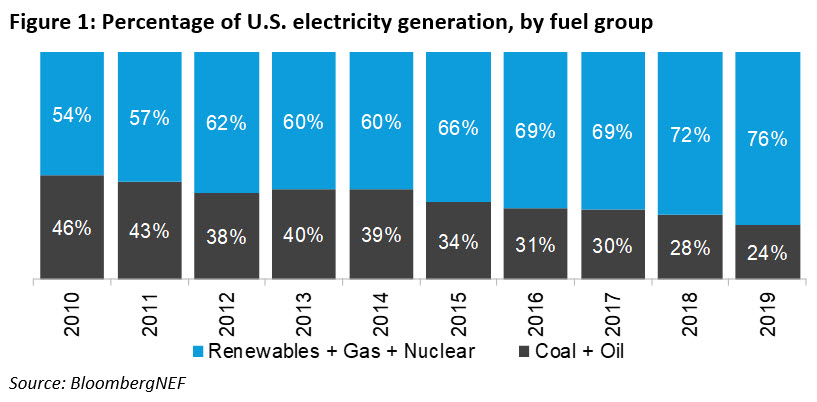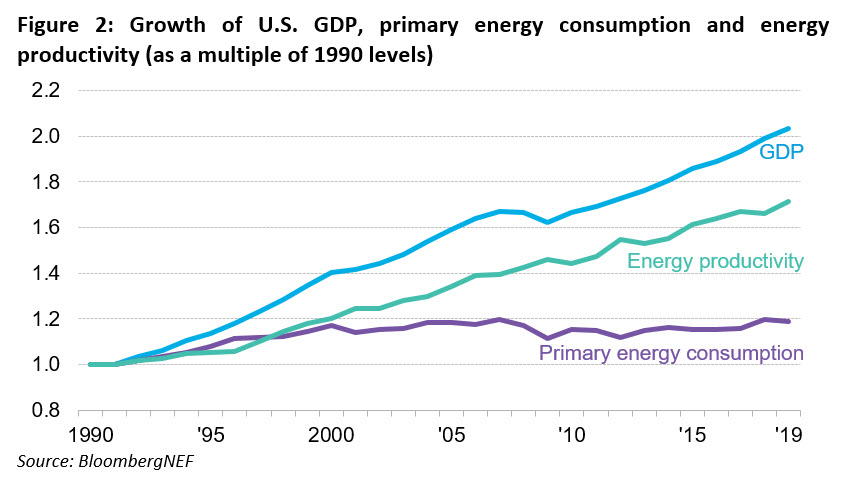Sustainable Energy in America Factbook highlights the 2010s – an era of economic growth, reduced CO2 emissions and sharply falling energy costs for consumers
Washington, D.C., February 13, 2020 – The U.S. overhauled how it produces, delivers, and consumes energy over a momentous decade of change, according to a new report from BloombergNEF (BNEF) and the Business Council for Sustainable Energy (BCSE). In the process, the U.S. posted 10 straight years of economic growth, while cutting both power-sector CO2 emissions and consumer energy costs to their lowest levels in a generation.
The eighth edition of the Sustainable Energy in America Factbook published by BNEF and the BCSE chronicles a profound transformation in U.S. energy that is still very much underway. The report, which includes over 130 slides, provides users with straightforward charts to understand how the change has impacted most segments of the energy sector.
“The transformation we have seen in the last decade has far exceeded expectations,” said Lisa Jacobson, BCSE President. “The facts show that we grew the economy, improved energy security, and cut emissions at the same time – all while making energy more affordable to consumers.”
Utility-scale renewables were just emerging in 2009, and now they win generation contracts on economic grounds. Battery technology is one tenth of its cost in 2009. Today, there are nearly over 85 million “smart meters” in U.S. homes and businesses, up from 9.6 million a decade ago. The number of residential natural gas customers grew by 8% in the last decade while overall residential consumption of gas rose by 5% due to energy efficiency. Consumers are now spending record low proportions of their household budgets on energy costs, a 22% decline since 2009.
The 2020 Factbook showcases the impact of sustainable energy[1] over the last decade and highlights findings for 2019 that follow the macro trends of the 2010s:
Renewable energy became the cheapest new generation source in many U.S. power markets. The U.S. has over 2 times more renewable power generating capacity today than a decade ago. Solar capacity in 2019 was 80 times greater than what it was at the end of 2009.
Energy efficiency choices have proliferated, with federal programs helping high-efficiency appliances reach mass markets and state codes bolstering building efficiency. The economy grew every year in the past decade and energy use fell in five of the ten years. U.S. energy productivity (GDP/energy consumption) improved 18% between 2010 and 2019, benefiting businesses and households.
Natural gas became the primary source of U.S. power generation and shifted the scales in the global market. Between 2010 and 2019 domestic natural gas production jumped 50%, and natural gas went from providing 24% of the nation’s electricity to 38%. The U.S. increased its export capacity to exceed its import capacity, building stronger trade relationships around the world. In 2019, the U.S. exported more gas than it imported.
“Technological innovation plus economies of scale are revolutionizing the energy world,” said Ethan Zindler, BloombergNEF’s head of Americas. “The idea that energy must be dirty to be cheap is simply a myth.”

“Emerging trends for sustainable energy are proliferating consumer choice and empowerment. Digitalization and the Internet of Things have made people more aware of their energy use, as the options for efficient products and services are also expanding,” Ms. Jacobson added.

The fact that 18 regulated utilities offer a green tariff for customers to choose cleaner electricity and that nine states have taken actions to to offer voluntary tariffs for renewable natural gas to homes and businesses, shows that customers are asking for cleaner options. Meanwhile, corporate renewables procurement has surged. Virtually non-existent a decade ago, U.S. companies have signed contracts with wind and solar projects totaling 33.6GW as of year-end 2019.
[1] Sustainable energy is inclusive of renewable and natural gas-fired energy, as well as energy efficiency and energy storage.
About the Factbook
The 2020 Factbook is the eighth edition of an annual report that outlines key trends in sustainable energy. The 2020 Factbook provides a comprehensive overview of the American energy marketplace, including energy efficiency, natural gas and renewable energy. The report is available for download via the following link. The Factbook serves as a reference guide of sustainable energy statistics for use by media, business and industry.
Media Contacts
Veronika Henze, BNEF
+1-646-324-1596, vhenze@bloomberg.net
Julia Selker, BCSE
+1-541-908-5792, jselker@bcse.org
About the Factbook Partners
BloombergNEF (BNEF) is a leading provider of primary research on clean energy, advanced transport, digital industry, innovative materials, and commodities. With a team of experts spread across six continents, BNEF leverages the world’s most sophisticated data sets to create clear perspectives and in-depth forecasts that frame the financial, economic and policy implications of industry-transforming trends and technologies. Available online, on mobile and on the Terminal, BNEF is powered by Bloomberg’s global network of 19,000 employees in 176 locations, reporting 5,000 news stories a day. Visit https://about.bnef.com/ or request more information.
Business Council for Sustainable Energy (BCSE) is a coalition of companies and trade associations from the energy efficiency, natural gas and renewable energy sectors. The Council membership also includes independent electric power producers, investor-owned utilities, public power, manufacturers, and project developers and service providers for energy and environmental markets. Since 1992, the Council has been a leading industry voice advocating for policies at the state, national and international levels that increase the use of commercially available clean energy technologies, products and services.